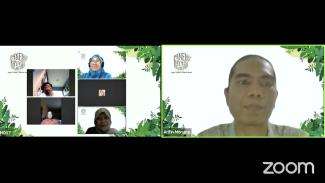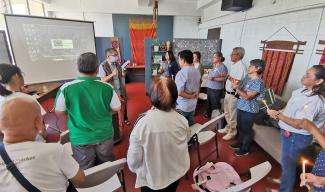From 2-18 December 2021, the PARARA (Panen Raya Nusantara, or Archipelago Harvest) Festival represented a consortium of 30 non-government organizations (NGOs) assisted by business groups and more than 105 Indigenous Peoples and Local Communities (IPLC) from all over Indonesia. These participants showcased local food traditions, along with a range of creative products, handicrafts and non-timber forest products (NTFPs). Kalimantan, Sumatra, Sulawesi, Java and the surrounding area, West Nusa Tenggara, East Nusa Tenggara, Bali, Papua and Maluku were featured at the festival, as well as a series of interactive dialogues .
This year's festival was held on a hybrid basis, with offline – or on-site – activities carried out at the PARARA Indonesian Ethical Store, a shop and restaurant that provides healthy and sustainable products and food from various local communities and indigenous peoples in Indonesia; and the online element conducted through the Zoom meeting app. The festival, which is held every two years, aims to support IPLCs in a fair and sustainable manner. Forming a bridge between producers and consumers, PARARA sets out to promote the importance of product management for IPLCs, while also preserving local wisdom and protecting the environment. By building awareness within the community and involving the government, PARARA is working to support local, healthy, fair and sustainable food, thereby strengthening national identity and fostering a sense of unity.
The theme of this year's festival was "Local Food Traditions For Indonesia's Future". In addition to local cuisine, the PARARA Festival celebrated a range of other IPLC products, including textiles and handicrafts. As part of the PARARA consortium, the Samdhana Institute took part in the festival through a series of webinar sessions, specifically in support of the Menoken Anim Ha Community in Merauke and the Bali JendraNath Community, each of whom took centre stage in talk shows held at the festival. Through the festival, Samdhana aims to create a platform upon which IPLCs can access new markets and have a say in policies that regulate local creative industries. By helping to synergise all stakeholders in the local creative economy, Samdhana hopes to enable a more pro-local, profitable and sustainable business environment for IPLCs throughout Indonesia.
Indigenous Community Business Funding Webinar
One of the events held at the 2021 PARARA Festival series was a webinar with the topic ‘Indigenous Community Business Funding’. This webinar was held online on Saturday, 4 December 2021 and was attended by more than 70 participants from small and medium enterprises owned by IPLCs, as well as members of the general public.
This webinar was held in order to address the concerns regarding market conditions of small and medium-sized business units that have been affected by the Covid-19 pandemic. Initiated by the AMAN Mandiri Producer Cooperative (KPAM), a member of the PARARA consortium, this webinar covered issues such as funding or capital models that can be used to help IPLC businesses stay afloat during the current crisis.
One of the key speakers, S. Masiun from the Keling Kumang Credit Union, discussed Credit Union as a solution to IP financial problems in West Kalimantan. Another speaker, Suroto, as Chairman of the Association of Strategic Socio-Economic Cadres (AKSES-Indonesia), explained the process of People's Economic Awakening and Independence through Cooperatives. Meanwhile, Rahmi from Toko Kita - KPAM Business Unit, Hulu Sungai Tengah Branch, South Kalimantan Province shared a success story from the Meratus Dayak community, involving Toko Kita (ToKit) as a business centre for product promotion and marketing for the Meratus Dayak Indigenous Community.
The Samdhana Institute, represented by Patti R. Rahayu as the Grant Coordinator, explained the Small Grants Scheme for IPLC Business Empowerment and Development. She presented the various types of IPLC empowerment support for capacity building in mentoring for institutional strategic planning, as well as training. Through the Samdhana Institute, grants support for IPLCs (with funding sourced from several donor agencies) are provided in the form of micro, small, medium and large grants, travel grants and emergency grants. Patti said "The various types of grants are allocated according to the needs of the IPLC partners, and dependent upon their ability to manage them effectively."
Patti also explained the mechanism for the grant application process and the priority themes that were the basic considerations in granting grants. She also shared a number of success stories during the webinar, including one from the Tourism Awareness Group (Pokdarwis) in Gerduren Village, Purwojati District, Banyumas, Central Java; a unique story, focused on the involvement of women in managing grants given through the Dedicated Grant Mechanism-Indonesia (DGM-I). This represents one of the central pillars of the Samdhana Institute: working to recognise and increase the involvement of women in the work carried out by Samdhana partners.
The webinar allowed participants to engage in active dialogue with experts and share knowledge about access to funding support for IPLC business capital. They also gathered valuable information on easily accessible funding models and independent businesses developed by and for IPLCs.
Parara Talk Show with the Menoken Anim Ha Community, Merauke
Held in a hybrid format on Sunday, 12 December 2021 from 13.00–15.00 (WIB), the talk show was themed "Local Food and the Menoken Vision for Merauke 2022". The event featured various discussions about sago as a local food staple, alongside various other ingredients such as kumbili tubers. Participants also got to see a creative menu made from sago. Although mostly online, the demonstration of processed sago offered a very appetising spectacle.
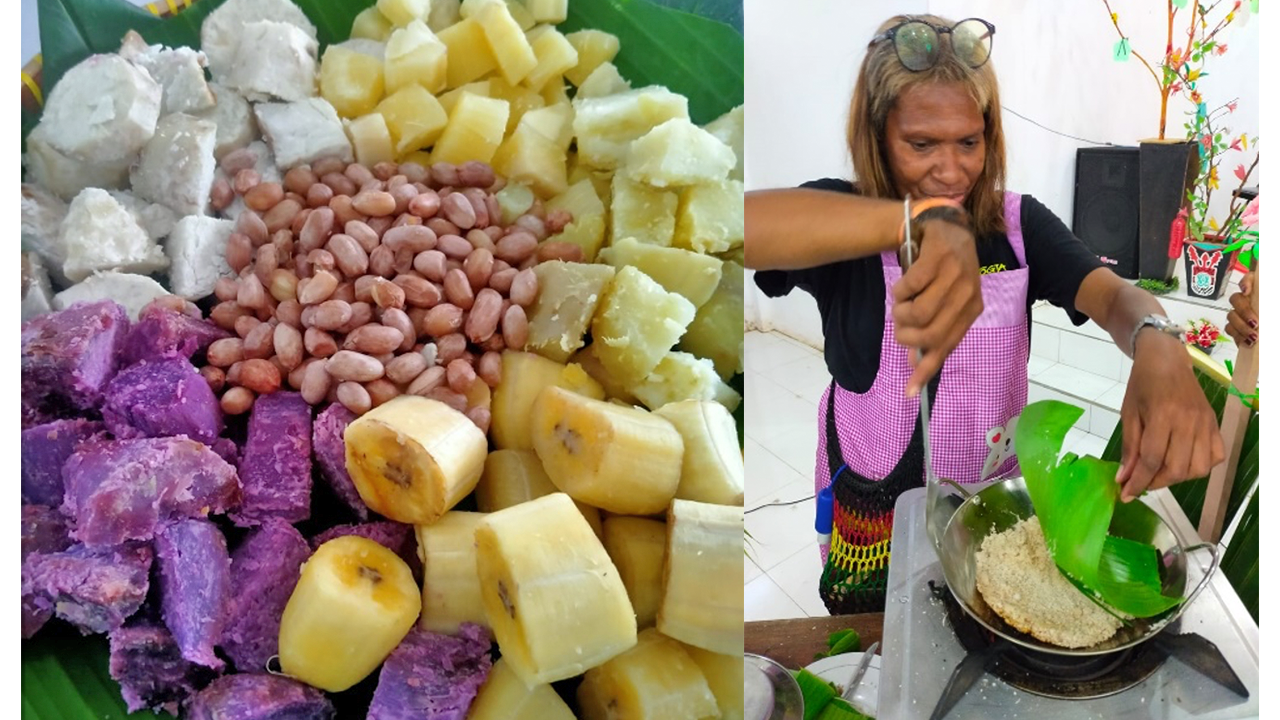
During the talk show, speakers shared their knowledge and experiences, discussing whether the stock of sago and other local foods would be sufficient for Merauke in 2022. Betty (a sago flour activist) and Tobby (a local food MSME) said that the current number of sago plants is a concern, because they only grow in a limited number of spots. Conversion of land from customary areas to plantations, combined with forest and land fires, have caused a decline in sago crops. Sago plants need an average of 7 to 9 years to be ready for harvest. The community must therefore replant and replenish sago to meet its dietary needs in the years ahead. Both Betty and Tobby encouraged the community to set an example, especially to the younger generation.
Hesty, an educator from Yanggandur village, shared stories about their activities with the PKK group, namely producing red fruit oil, trigona (forest) honey, and candlenut oil, as well as some local foods. Hesty also shared a story about kumbili (in other places known as gembili), which is the main food source for the Kanum tribe/Marind sub-tribe who inhabit the Rawa Biru area of Yanggandur, Sota. Kumbili is a kind of tuber; a unique plant that requires 8-9 months of growth and careful attention, including various traditional rituals, before it can be harvested.
The talk show was enlivened by performances of folk music and traditional dancing by the Marind tribe. The Yospan dance is one of the social dances for young people, which comes from two combined dances, namely the Yosim dance (from Sarmi) and the Pancar dance (from Biak). This dance has five movements, each of which have been standardised by the Tanah Papua Arts Council. The costumes used are more modern, following the current trends.
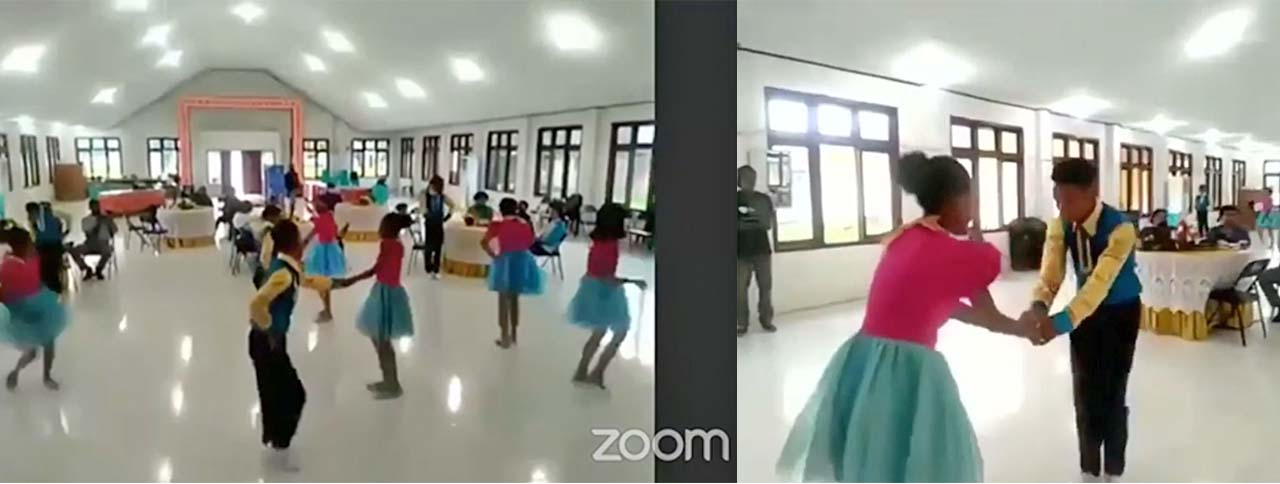
Explore Bali with the JendraNath Community: Local Food Stories and Dances
After the PARARA talk show in Merauke, it was time for the JendraNath Community to roll out various products from the local community and Balinese IP in a talk show themed “Explore Bali with the JendraNath Community: Local food stories and dances”, which was held in a hybrid format from 16.30–18.00 (WIB). This talk show introduced 15 Balinese specialties, guided by Emmy and Pak Wayan from JendraNath. This included Jembrana Betutu Chicken, which uses spices-based seasoning called base genep; sate lilit, which traditionally is done by men (starting from slaughtering the meat, mixing dough, wrapping the satay and barbequing it); and Rujak Bulung, which uses seaweed. There was also a typical Balinese snack called jaje Bali, along with es daluman and es kolak pisang drinks, which use milk from coconuts that have been burned to provide a more savoury taste.
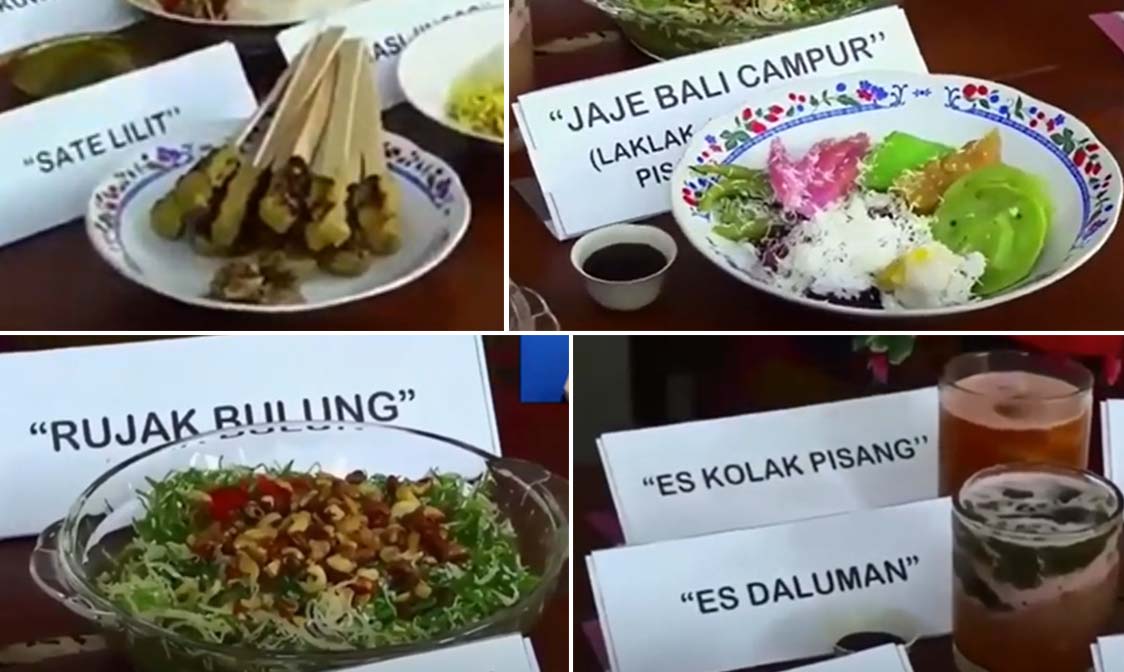
JendraNath was formed about two years ago, as a market hub that promotes and shares knowledge about community products both from Bali and other areas such as Kulon Progo and Lampung. There are organic products such as canna starch, chocolate and various drinks. Alongside its partners – namely Dapur Imo, Ratu Restaurant, and Geranath (JendraNath Cart) – the organization offers a place for young people to be creative in making products from traditional ingredients (e.g., making crepes from arrowroot starch) and then selling them locally, via the JendraNath store.
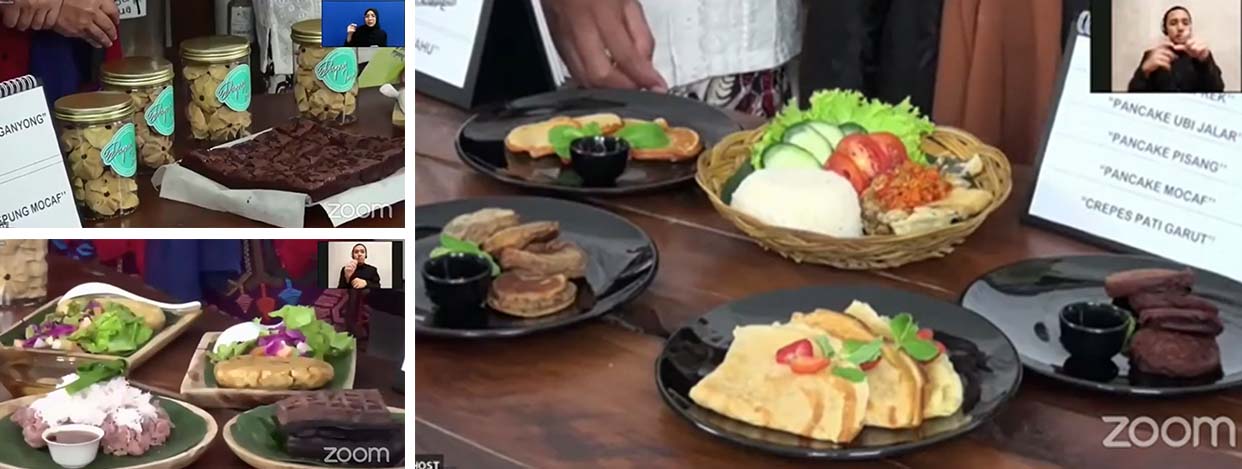
The talk show participants were also entertained by a performance from Sanggar Nadewa Bali, who presented the Panjali (a traditional welcoming dance) and the Tani (which describes the activities of farmers). These performances were accompanied by an explanation/narration by Bli Gunadi Putra from Sanggar Nadewa.
The PARARA Festival is one of various efforts to introduce and promote the products of IPLCs who are partnered with Samdhana. These activities were presented in line with the Samdhana mission, which is to support IPLCs and improve their welfare by securing land rights to customary territories.
